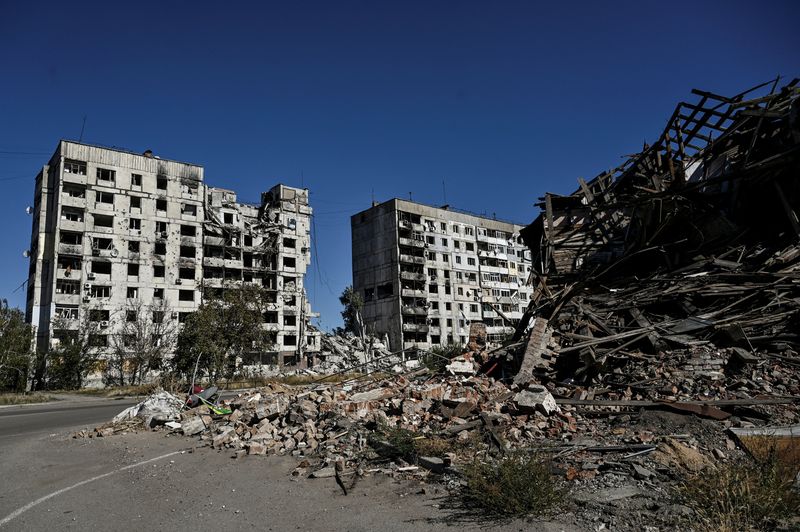By Josh Smith
SEOUL (Reuters) - NATO Secretary General Mark Rutte confirmed on Monday that North Korean troops have been sent to Russia and that some units have been deployed to the Kursk region, calling the move a "significant escalation" in Pyongyang's military aid to Russia.
The United States, Ukraine and South Korea have accused North Korea of dispatching the troops, estimated to number in the thousands, to aid Russia in the war in Ukraine.
Moscow and Pyongyang initially dismissed reports about the North's troop deployment as "fake news". But Russian president Vladimir Putin on Thursday did not deny that North Korean troops were currently in Russia and a North Korean official said any such deployment would be lawful.
Here is what we know so far:
WHAT ARE THE REPORTS?
Ukraine's military intelligence service said last week that the first units of North Korean troops trained in Russia had been deployed in the Kursk region, a Russian border area where Ukrainian forces staged a major incursion in August.
A total of around 12,000 North Korean troops, including 500 officers and three generals, were already in Russia, and training was taking place on five military bases, the agency said.
Ukraine's President Volodymyr Zelenskiy said North Korea had previously deployed officers in Russian-occupied territory within Ukraine to assess the situation before deploying troops.
South Korea's National Intelligence Service (NIS) said it had tracked around 3,000 troops, including special forces, shipped by Russian naval vessels to the country's Far East for training and acclimatising at military bases there, probably to be deployed for combat in the war.
The South also said it had used AI facial recognition technology to identify a delegation of dozens of North Korean officers visiting frontline areas in Ukraine, to give guidance on North Korea-made KN-23 ballistic missiles fired at targets there.
The delegation included a key figure in the North's missile development, identified by analysts at Seoul-based NK PRO as Ri Song Jin, glimpsed in photographs last year while accompanying leader Kim Jong Un to factories that turn out missiles.
The troops have been supplied with Russian military uniforms, weapons and false identification documents ahead of being deployed for combat, it said.
WHY WOULD NORTH KOREA HELP RUSSIA?
Putin has said a treaty he signed with Kim Jong Un during a visit to Pyongyang in June included a mutual assistance clause for each side to help the other repel external aggression.
Analysts say North Korea could benefit from providing weapons and troops by gaining experience and insight from operating on a battlefield.
Pyongyang, heavily sanctioned for its nuclear weapons programme, also appears to be gaining major imports of oil and other products from Russia, according to foreign intelligence agencies and commercial satellite imagery examined by analysts.
A report by a think tank affiliated with South Korea's NIS estimated that the cash-strapped North earned about $540 million last year from arms sales to Russia.
WHAT HAS THE REACTION BEEN?
Last week South Korea said it had protested the deployment to Russia's ambassador, and dispatched a senior delegation to brief NATO on Monday.
Seoul has also said it is considering phased countermeasures, including possible changes to its stance against directly providing weapons to Ukraine.
Ukraine's top presidential official said on Monday that sanctions would not be a sufficient response to the deployment and called for "weapons and a clear plan to prevent North Korea's expanded involvement".
Germany and Austria summoned North Korea's top envoys in their countries on Wednesday to register their concerns.
The leaders of Britain and Finland have said Russia's use of North Korean troops would be a sign of desperation.
China's foreign ministry said on Thursday it was not aware of North Korean troops being in Russia and it hoped "all parties will promote a de-escalation of the situation and commit themselves to a political solution" in Ukraine.
WHAT CHALLENGES DO NORTH KOREAN TROOPS PRESENT TO UKRAINE?
Russia has fired dozens of North Korea-made ballistic missiles and has received large numbers of artillery shells and anti-tank rockets, say South Korea, Ukraine, the United States and independent researchers.

Military analysts say there are questions on how Russia would incorporate North Korean troops on the ground, and that, like the weapons, an infusion of troops was unlikely to be a game changer but could help prolong the conflict.
"Russia's war zone has expanded significantly, and with Ukrainian forces making advances even into Russian territory, North Korean troops could play role in defending against such incursions," said Kim Yong-hyun, of South Korea's Dongguk University. "While North Korea's involvement may not be decisive for Russia, it could still provide meaningful support."